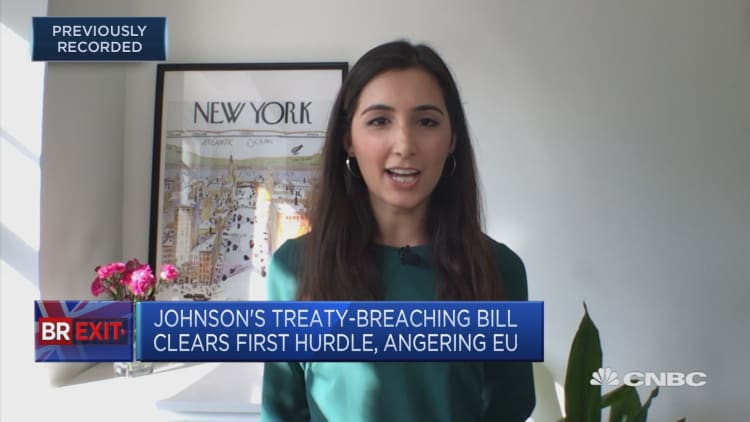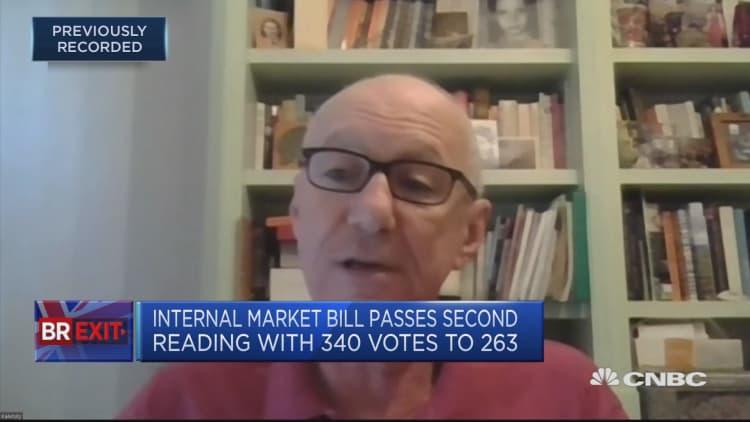LONDON — The blow to the U.K. of failing to reach a trade deal with the European Union would be more costly than dealing with the coronavirus, Goldman Sachs economists have warned.
In fact, the investment bank said the fallout of a no-deal outcome was likely to be "two to three times larger" than that of "the worst pandemic witnessed in post-war history."
The U.K. government has over the last week challenged previous commitments with the European Union, increasing the odds that both sides will not manage to put a trade agreement together before the end of the year. This "no-deal" outcome would result in higher costs for exporters on both sides.
Some analysts have suggested that these costs would blend in with the hit to the U.K. economy from the global pandemic, making it difficult to determine what will be the real source of economic pain in the years to come. However, Goldman Sachs economists disagree.
"We are sceptical of the argument that the sheer scale of the economic fallout from Covid-19 will obscure the economic impact from a breakdown in Brexit negotiations," they said in a research note Monday.
The investment bank argued that the industries hit hardest by the coronavirus — such as recreational, food and drink, and wholesale businesses — are different from the sectors mostly likely to be punished by the U.K.'s departure from the European Union, which include chemicals, textiles and electrical equipment businesses.
I'm afraid that next year (the performance of the U.K. economy) is going to be even worse.Anatole Kaletskyfounder and co-chairman of Gavekal Research
However, they added that when considered together, "from an aggregate perspective, the present value of the long-run impact of failing to reach an EU-U.K. free trade agreement is likely to be two to three times larger (on reasonable assumptions) than the present value of the cyclical damage wrought by the coronavirus crisis."
The U.K. economy grew by 6.6% in July — the third consecutive monthly rise, according to data from the Office for National Statistics released last week. However, the public body warned that the U.K. "has still only recovered just over half of the lost output caused by the coronavirus."
In addition, the unemployment rate increased to 4.1% in the three months to July — 0.3 percentage points above the rate seen a year ago, according to data out Tuesday.

"The world's worst performing major currency, stock market and economy have all been located in Britain since Boris Johnson was re-elected last December," Anatole Kaletsky, founder and co-chairman of Gavekal Research, said in a note Monday.
Speaking to CNBC on Tuesday, he added that he was "very worried about the performance of the U.K. economy going forward.
"I'm afraid that next year is going to be even worse because of this combination of Covid, which is still very much out of control, and this additional blow from actually almost anything that comes out of these Brexit negotiations," he said.
The EU and the U.K. have said they remain in close contact and their plans to have another round of trade talks at the end of the month are still on the table.

However, the EU has made it clear that it cannot sign new trade arrangements if the U.K. violates previous already-legislated commitments.
On Monday, U.K. legislators cleared the first legal hurdle in implementing the so-called Internal Market Bill — a set of new laws that, if cleared in both chambers of the U.K. parliament, would breach international law. The EU has asked the U.K. to amend the bill as soon as possible and no later than until the end of the month — if it fails to do so, the EU will likely challenge the U.K. government in court.
Both sides have given themselves until October to put together an agreement that can then be ratified before the end of the year, but analysts are growing increasing skeptical that this is going to happen.


